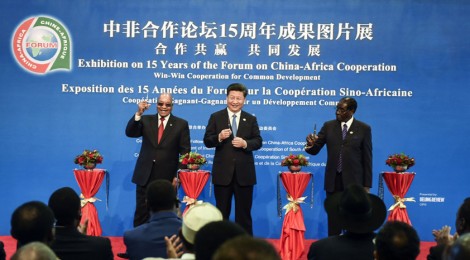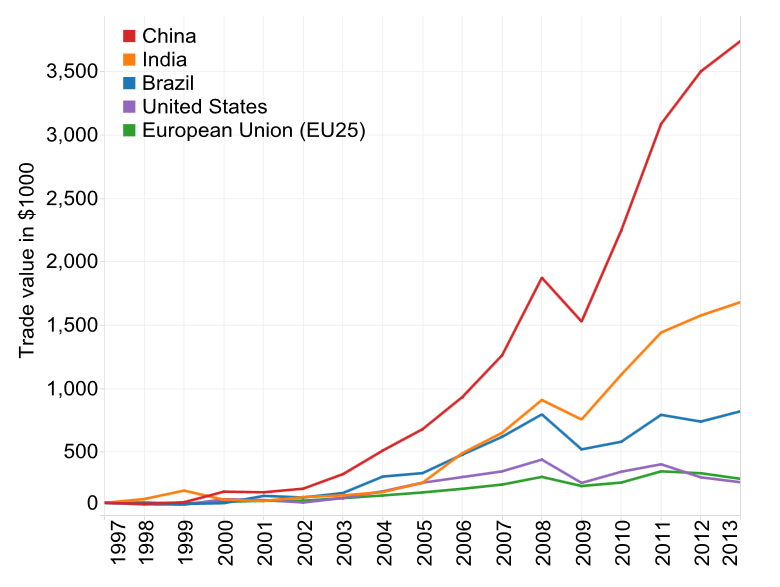
6th Forum on China-Africa Cooperation: Xi’s pledge raises mixed reactions
The 6th Forum on China–Africa Cooperation (FOCAC) took place last week in Johannesburg, where leaders from more than 40 African countries gathered on December 4 and 5. The forum is held once every three years and represents the main platform for official high-level political and economic dialogue between Africa and China.
This year’s forum hosted China’s President Xi Jinping, who announced as much as €55 billion in financing for development across Africa, in so doing breaking with tradition of doubling China’s financing commitment at each FOCAC meeting, this time tripling it. China has been Africa’s most important trading partner since 2009, yet in the first half of this year its investment in Africa plunged by 84 percent. Under such circumstances, Xi’s pledge may be aimed at reaffirming China’s commitment to the continent, despite the economic turmoil caused by its slowing growth.
 Trade volume to Africa 1997-2010
Trade volume to Africa 1997-2010
However, the news has not been welcomed with enthusiasm by everyone, as China faces growing international criticism over its business practices in Africa. Chinese presence in the continent has always engendered debate over whether it prompts African countries’ development, or is just aimed at taking advantage of natural resources. The issue is controversial and, in Western debate, is also generally linked to progress in terms of democracy and human rights as requirements to receive/provide foreign aid.
Some watchers of China-Africa relations highlight how the negative perception of China’s role in the continent is often due to false beliefs. China is commonly pictured as going to Africa to satisfy its insatiable thirst for natural resources and to export cheap manufactured goods. Although the Chinese have certainly gained advantageous trade deals in exchange for their help to African countries in developing nascent oil sectors, China’s investments also yield vital infrastructure, provide jobs, and boost the skill set of the local workforce.
Then as well, the recently announced investments will finance ten projects for infrastructural development to be conducted in cooperation between Chinese and African partners. These projects are supposed to tackle three areas which, according to the Chinese president, are slowing down the continent’s development: poor infrastructure, lack of qualified and skilled personnel, shortage of funds.
 Damisa Moyo, a Zambian-born international economist, has criticised the Western aid regime, and looked east for answers to Africa’s development questions. In her words: “China’s African role is wider, more sophisticated and more business-like than any other country’s at any time in the post-war period”.
Damisa Moyo, a Zambian-born international economist, has criticised the Western aid regime, and looked east for answers to Africa’s development questions. In her words: “China’s African role is wider, more sophisticated and more business-like than any other country’s at any time in the post-war period”.
Some observers stress that the Chinese scope in official involvement for loans and aid tends to be overestimate, alongside with the myth of Chinese companies employing mainly their own nationals. Another exaggeration would be that of China’s extensive land grabbing, which goes with one widely circulated story presuming that China had purchased half the farm land in DR Congo.
Anyway, not everyone is on board. “The dominance of China in Africa … has the feel of the Borg in Star Trek assimilating all, or Amazonian army ants, conquering everything in their path” wrote President Stephen Hayes of the Corporate Council on Africa. Some African leaders have expressed criticism about China’s relationship with Africa, with South African President Jacob Zuma describing it as “unsustainable” and following a neo-colonialist pattern.
What is certain is that FOCAC is a demonstration that China’s political and economic engagement in Africa has reached a critical mass. Considering the emphasis president Xi is now putting on industrialization through his “One Belt, One Road” strategy, opportunities may arise for some African nations.




